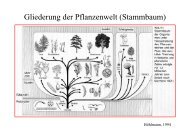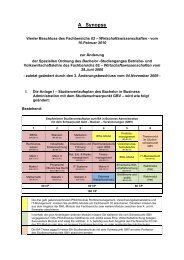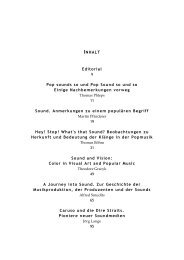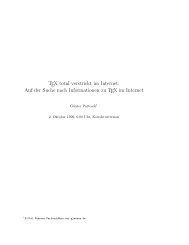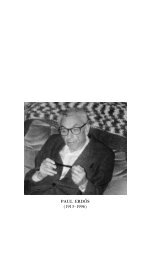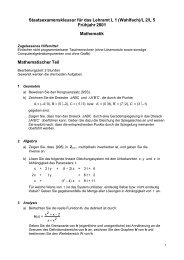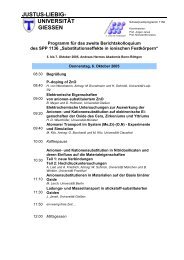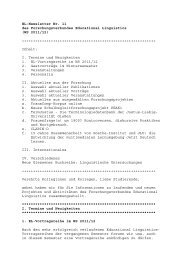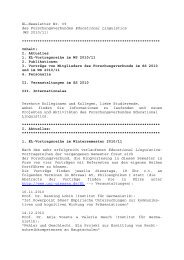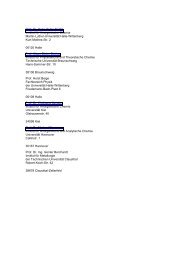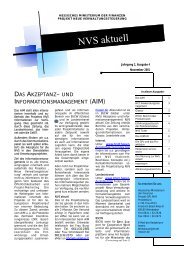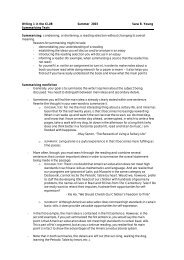World War II Propaganda
World War II Propaganda
World War II Propaganda
Create successful ePaper yourself
Turn your PDF publications into a flip-book with our unique Google optimized e-Paper software.
<strong>World</strong> <strong>War</strong> <strong>II</strong> <strong>Propaganda</strong><br />
The Power of Persuasion<br />
A presentation by Janine Havanci and Julia Götze
Definition of „<strong>Propaganda</strong>“<br />
A specific type of message presentation<br />
aimed at serving an agenda<br />
Propagates a philosophy or point of view<br />
Aim: to actively influence people‘s<br />
opinions
SUBDIVISIONS OF PROPAGANDA<br />
Face-to-face communication<br />
(social organisations, group discussions, speeches)<br />
Audiovisual media<br />
(television & sound motion pictures)<br />
Audio media<br />
( radio & loudspeakers)<br />
Visual media<br />
(essays, posters, cartoons, (school)books etc…)
German vs. British<br />
<strong>Propaganda</strong>
1.1. German face-to-face communication<br />
Political mass<br />
assemblies<br />
Speeches<br />
Organisations (KdF)
Hitler – a talented speaker ?<br />
( Art of Mass Seduction)<br />
eloquent<br />
rehearsed gesture<br />
copied classical<br />
literature<br />
Started off calmly and<br />
monotonously but<br />
worked himself up<br />
into hysteric yelling
1.2. British face-to-face communiation<br />
• Speeches<br />
May 13, 1940<br />
Winston Churchill<br />
"Blood, Toil, Tears<br />
and Sweat”<br />
First Speech as Prime<br />
Minister to the House<br />
of Commons
2.1. German audiovisual media<br />
Leni Riefenstahl<br />
(1902-2003)<br />
Director<br />
Producer<br />
Actress<br />
Dancer<br />
Photographer
1933: Victory of Faith<br />
<strong>Propaganda</strong> Films<br />
1935: Triumph of the Will<br />
Documentary films about the NSDAP‘s Reich Party Congress in Nuremberg
<strong>War</strong>time Cinema<br />
2.2. British audiovisual media<br />
Second <strong>World</strong> <strong>War</strong> interrupted progress<br />
most studios closed, while a few continued to make films<br />
for propaganda purposes<br />
aimed to encourage patriotic feeling and boost national<br />
morale
<strong>War</strong>time movies<br />
„In In which we serve“ (1942) Noel Coward<br />
„Millions Millions like Us“ (1943)<br />
• „London London can take it“ (1940)<br />
• „Listen Listen to Britain“ (1941)
Joseph Goebbels<br />
Reich Minister for Public Enlightenment and <strong>Propaganda</strong><br />
total control of communications media<br />
a relentless Jew-baiter<br />
nickname : „Poison Dwarf“
3.1. German audio media<br />
The „Volksempfänger“<br />
• first produced in 1933<br />
• relatively cheap (65 RM)<br />
• most effective<br />
propaganda medium<br />
• every 2nd household<br />
owned one<br />
• hardly received foreign<br />
stations
3.2. British audio media<br />
BBC (British Broadcasting Corporation)<br />
was formed 1927 by means of a royal charter<br />
Radio was used for internal and external propaganda<br />
broadcasted radio programmes to countries under the<br />
control of Nazi – Germany<br />
These programmes went out in 40 different languages
How did they get the enemy and the civilian<br />
population to listen to their broadcasts?<br />
-Radioleaflets were dropped from aircraft over the<br />
enemy or friendly target areas and told the finder<br />
exactly when and where the broadcast could be heard.<br />
-Germans prepared many of them. They dropped them<br />
on the Allied troops in Italy and later Europe<br />
-sometimes they were prepared in two sizes- a large<br />
sheet for dropping from aircraft - a small sheet for<br />
delivery by artillery shell<br />
-half a dozen different types were kown<br />
-some were marked with AI or a small star
Radio Leaflets During <strong>War</strong>time<br />
The use of radio as a medium of propaganda in wartime<br />
was made famous during WW<strong>II</strong> by Tokyo Rose and Axis<br />
Sally. The British listened to William Joyce (Lord Haw<br />
Haw) broadcasting from Germany.<br />
In later wars, American soldiers would hear the voice of<br />
Hanoi Hannah and Baghdad Betty. Radio propaganda<br />
can be broadcast over great distances to a large<br />
audience at a relatively low cost.
Axis Sally<br />
Lord Haw – Haw<br />
(William Joyce)<br />
Tokyo Rose
Radioleaflet
4.1. German visual media<br />
„My My Struggle“<br />
author: Adolf Hitler<br />
autobiographical<br />
blueprint for his political plans<br />
when he was at the reins,<br />
millions of copies were sold<br />
was as common to see as the<br />
Bible in German housholds
Publisher of the Nazi<br />
newspaper<br />
„Der „ Der Stürmer“<br />
Released anti-Semitic<br />
books for children<br />
one of the best<br />
known Nazi-leaders<br />
Julius Streicher
Circulation of „Der Stürmer“<br />
Year<br />
1927<br />
1933<br />
1934<br />
1935<br />
1938<br />
Circulation<br />
14,000<br />
25,000<br />
113,000<br />
280,000<br />
473,000
Facts about „Der Stürmer“<br />
came out weekly<br />
should appeal to the common man<br />
short articles with short sentences<br />
simple vocabulary<br />
ideas were repeated<br />
cartoons were easily understood<br />
filled with stories about scandal, sex and<br />
crime
Caricatures taken from „Der Stürmer“
Anti – Semitic books for children<br />
The Toadstool<br />
published in 1938<br />
sometimes used in<br />
schools
Pictures from „The Toadstool“
4.2. British visual media<br />
Daily Express, Monday, April 28, 1941<br />
German Tanks Enter Athens<br />
Paratroops seize Corinth<br />
Express Special <strong>War</strong> Despatch<br />
„No No Escape“<br />
„Tanks Tanks charge“
The Homefront
The Homefront (<strong>II</strong>)
Allied Unity
The Fighting Forces
Comics and caricatures<br />
„ I await your next ̍ ̍ inspiration ̍ ̍ , mein Fuehrer.“
Comics and Caricatures (<strong>II</strong>)
Fire Bomb Fritz
Disney and Nazi – Germany
Donald in Nutziland
Quote:<br />
„The The receptivity of the great masses is very limited,<br />
their intelligence is small, but their power of<br />
forgetting enormous. In consequence of these facts,<br />
all effective propaganda must be limited to a very few<br />
points and must harp on these slogans until the last<br />
member of the public understands what you want him<br />
to understand by your slogans […]
1) Who might have said or written this<br />
quote?<br />
Adolf Hitler<br />
„My „ My Struggle“ Chapter 6<br />
„<strong>War</strong> „ <strong>War</strong> <strong>Propaganda</strong>“<br />
2) Would you agree with this statement?
Thank you for your patience…




